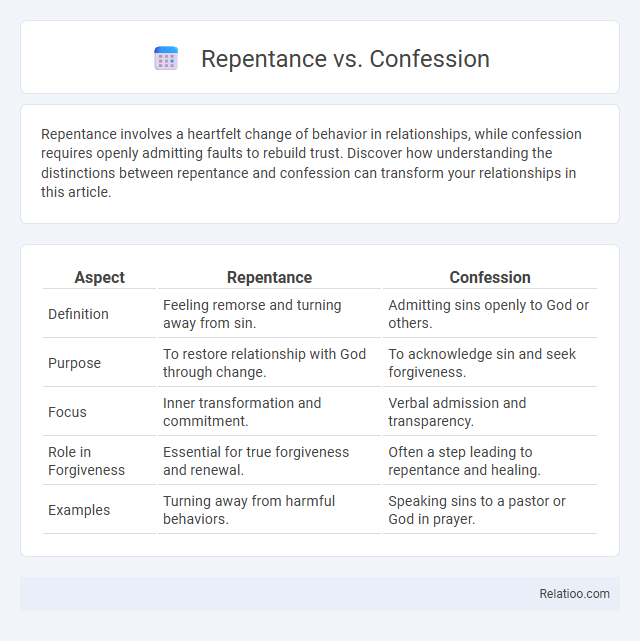Repentance involves a heartfelt change of behavior in relationships, while confession requires openly admitting faults to rebuild trust. Discover how understanding the distinctions between repentance and confession can transform your relationships in this article.
Table of Comparison
| Aspect | Repentance | Confession |
|---|---|---|
| Definition | Feeling remorse and turning away from sin. | Admitting sins openly to God or others. |
| Purpose | To restore relationship with God through change. | To acknowledge sin and seek forgiveness. |
| Focus | Inner transformation and commitment. | Verbal admission and transparency. |
| Role in Forgiveness | Essential for true forgiveness and renewal. | Often a step leading to repentance and healing. |
| Examples | Turning away from harmful behaviors. | Speaking sins to a pastor or God in prayer. |
Understanding Repentance: A Deeper Meaning
Understanding repentance involves recognizing a profound transformation in your heart and actions, beyond simply confessing sins. Repentance signifies sincere remorse and a commitment to change, distinguishing it from confession, which is primarily the acknowledgment of wrongdoing. Embracing true repentance fosters spiritual growth and restores your relationship with the divine.
What is Confession? Unveiling Its True Purpose
Confession is the act of openly acknowledging one's sins or wrongdoings to a spiritual authority or within oneself, serving as a crucial step toward spiritual cleansing and accountability. Its true purpose is to foster honesty, humility, and a transformative process that leads to forgiveness and reconciliation. Unlike repentance, which involves a sincere commitment to change behavior, confession emphasizes the verbal admission and acceptance of fault as essential to healing and growth.
Biblical Roots of Repentance and Confession
Biblical roots emphasize repentance as a heartfelt turning away from sin, grounded in genuine remorse and transformation of the mind (metanoia). Confession involves openly admitting sins before God or others, as seen in 1 John 1:9, which highlights confession's role in divine forgiveness and cleansing. While repentance demands an inner change aligned with God's will, confession serves as the outward acknowledgment affirming this commitment to spiritual renewal.
Key Differences Between Repentance and Confession
Repentance involves a profound internal transformation and sincere remorse for wrongdoing, while confession is the explicit acknowledgment and verbal admission of sins or faults to another party. The key differences between repentance and confession lie in their focus: repentance centers on genuine change of heart and turning away from sin, whereas confession emphasizes transparency and accountability through disclosure. Both practices are essential in many religious traditions, but repentance signifies commitment to moral renewal, whereas confession facilitates seeking forgiveness and reconciliation.
The Role of the Heart: Sincerity in Repentance vs. Confession
Sincerity in repentance stems from genuine remorse in your heart, driving a true transformation and commitment to change, while confession involves openly admitting faults without necessarily ensuring heartfelt repentance. The role of the heart is pivotal, as repentance requires an inner sincerity that moves beyond mere words to foster spiritual renewal. Confession without sincere repentance may lack the depth needed for authentic forgiveness and personal growth.
When Confession Isn’t Enough: The Need for True Change
Confession involves admitting wrongdoings, but without genuine repentance, it lacks transformative power. True change requires deep remorse and a commitment to alter behavior, going beyond merely acknowledging faults. Repentance fosters lasting renewal, making it essential when confession alone fails to produce meaningful personal growth.
The Process of Repentance: Steps Toward Transformation
The process of repentance involves recognizing wrongdoing, feeling genuine remorse, and making a conscious decision to change behavior. Confession is the act of openly admitting sins or faults, often to a religious leader or community, which fosters accountability and spiritual healing. True repentance goes beyond confession by incorporating corrective actions and a heartfelt commitment to transformation, leading to lasting personal growth and renewal.
Confession in Religious Practices Around the World
Confession plays a crucial role in various religious practices globally, serving as a formal acknowledgment of sins before a deity or spiritual authority to seek forgiveness. In Christianity, particularly within Catholicism, confession involves a penitent verbally admitting sins to a priest, who grants absolution, making it distinct from repentance, which emphasizes sincere remorse and commitment to change. Other religions, such as Islam and Judaism, incorporate confession elements through prayer and personal accountability, highlighting its universal significance in spiritual cleansing and moral reconciliation.
Repentance and Confession: Their Impact on Spiritual Growth
Repentance involves a sincere turning away from sin and a commitment to change, while confession is the act of openly admitting one's wrongdoings, fostering accountability and humility. Your spiritual growth is deeply influenced by practicing both repentance and confession, as repentance brings inner transformation, and confession strengthens your relationship with God and community. Together, they cultivate a foundation for healing, forgiveness, and ongoing spiritual development.
Cultivating a Lifestyle of Repentance and Authentic Confession
Cultivating a lifestyle of repentance and authentic confession involves consistently recognizing personal shortcomings and openly admitting them to foster spiritual growth. Repentance requires a sincere change of heart and behavior, while confession involves verbalizing these faults, creating accountability and healing. Your commitment to this ongoing process deepens self-awareness, strengthens relationships, and aligns your life with core values of integrity and humility.

Infographic: Repentance vs Confession
 relatioo.com
relatioo.com